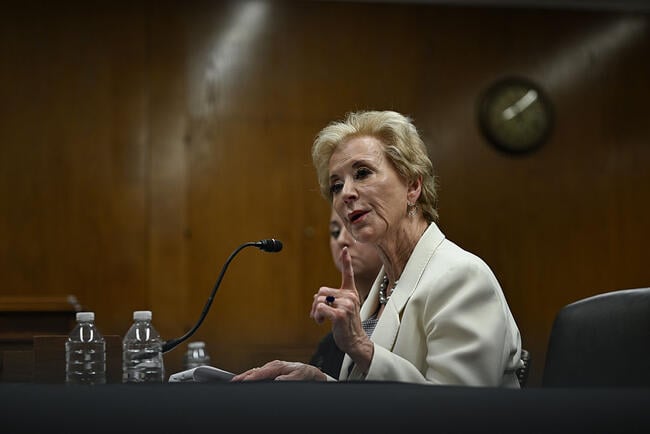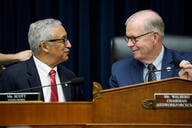You have /5 articles left.
Sign up for a free account or log in.

Education Secretary Linda McMahon defended her proposed spending cuts as she faced sharp questions from congressional Democrats.
Celal Gunes/Anadolu via Getty Images
Education Secretary Linda McMahon faced off with congressional Democrats Wednesday as they pummeled her with a slew of questions about the morality and effectiveness of the staffing cuts she has already made within her department as well as the spending cuts and program reforms she wants to make.
But McMahon repeatedly argued during the three-hour hearing that she was dutifully fulfilling the mandate of trust the American people have placed in President Trump to eliminate federal bureaucracy. Wednesday’s hearing was her third time testifying before Congress in the past month.
“With the staff that we’ve cut at the Department of Education—let me just reiterate what I’ve said before—we are totally in compliance with all of our statutory obligations,” she said.
Liberal lawmakers, however, didn’t buy it.
“We are struggling to understand how the actions you have taken at the Department of Education address learning gaps and improve academic outcomes,” said Rep. Bobby Scott, a Virginia Democrat and ranking member of the Education and Workforce Committee. If “resources are being cut for the sake of ‘efficiency,’ then who is doing the work to ensure that the mission of the department … is being met?”
Committee Democrats grilled McMahon over the legality of her attempts to freeze congressionally appropriated funding and punish colleges for allowing what she believes to be antisemitic protests and “illegal” DEI programs by canceling research grants. They often asked the secretary for simple yes or no answers, to which she responded, “It is not a yes or no answer.” Lawmakers also cut her off at times when she seemed not to answer their questions.
“I am answering the question,” McMahon said at one point. “I’m just not giving you the answer you want.”
Meanwhile, committee chair Tim Walberg and his Republican peers applauded the secretary for her endurance and composure when confronted with what they called Democratic fear-mongering.
“There is an implication in the criticism leveled at you, Madam Secretary, that the status quo is fine,” Walberg said. “The minority wants us to believe that the Department of Education is overseeing an education system in which students are thriving, and employers have access to a workforce prepared to succeed—neither of those are true.”
Much of the discussion focused on K–12 topics like how the department would continue to protect disabled students with fewer staff members or whether the Trump administration was trying to prevent certain low-income schools from receiving grants. When lawmakers did shift attention to higher ed, they voiced opposition to the administration’s crackdown on diversity, equity and inclusion programs as well as the participation of transgender athletes in women’s sports and the department’s attempt to silence campus protests by deeming them antisemitic.
In a few instances, lawmakers—mostly Republicans—asked McMahon about proposed reforms to the federal student aid system and college accountability measures.
As was the case in her previous appearances before Congress this year, McMahon appeared largely unfazed by the questioning, sticking to her talking points and reiterating the idea that she and Trump were returning education to the states and rooting out waste, fraud and abuse.
Here are four key moments from McMahon’s first appearance before the House Education and Workforce Committee.
McMahon Backed House Reconciliation Proposals
Early on, Walberg asked McMahon to discuss the One Big Beautiful Bill Act, which passed the House last month. In addition to funding historic tax cuts that would “jump-start the economy,” Walberg, who sponsored part of the bill, said it represented “the largest reform to how we fund higher education in decades.”
When asked to identify her top three education priorities for the bill, McMahon praised the committee’s proposal to hold colleges accountable for their students’ unpaid debt—otherwise known as risk-sharing.
“I don’t think it’s out of the question that we should require our colleges and universities to have a little skin in the game relative to the loans that are made,” she said.
McMahon also supported provisions to expand the Pell Grant to short-term workforce training programs and to limit access to Parent PLUS loans, a program that supports parents in paying for their children’s undergraduate degree. She didn’t say anything about the plan to change the eligibility requirements for Pell, which could cut off about 700,000 students from the grant program, or her separate proposal to reduce the maximum grant award by $1,600.
A Tense Exchange Over Viewpoint Diversity
Shortly after, Rep. Mark Takano, a California Democrat, got into one of the most notable quarrels of the entire hearing as he pressed McMahon on what counts as viewpoint diversity.
The Trump administration has recently criticized what it sees as a lack of viewpoint diversity at Harvard University and demanded that the institution hire more conservative professors if it would like to regain access to federal grant funding. At a Senate hearing Tuesday, McMahon said a federal law that prevents discrimination based on race and national origin gave the department the authority to make such demands.
Takano kicked off his round of questioning by asking McMahon if it was legal for the federal government to punish a private entity for “having a different viewpoint” than the president, to which McMahon responded, “What do you mean by that?” and “I don’t know what you mean by ‘punish.’”
The back-and-forth reached a climax when Takano asked McMahon if refusing to hire a history professor who denies the Holocaust would be an ideological litmus test.
“I believe there should be diversity of viewpoints relative to teachings and opinions on campuses,” McMahon said.
Takano snapped back, saying, “I think it’s pretty clear you haven’t thought through this idea of viewpoint diversity.”
McMahon’s Honesty Questioned
Democrats also pressed McMahon to explain why her department has frozen or canceled millions in federal grants and contracts.
Rep. Suzanne Bonamici, an Oregon Democrat, for example, reminded McMahon that during her Senate confirmation hearing in February, she promised to disseminate any funds appropriated by Congress regardless of any directives from the president to do otherwise.
Since then, however, the Department of Education has cut off funding to some grant programs that it deems related to DEI, gender identity or in response to accusations that colleges didn’t sufficiently address campus antisemitism. Recently, the department canceled three TRIO programs, saying they didn’t further “merit, fairness, and excellence in education.”
“You stood by as Elon Musk’s Department of Government Efficiency froze or terminated more than a billion dollars in congressionally directed federal grants,” Bonamici said. “So, Secretary McMahon, were you not being truthful when you testified in the Senate?”
McMahon questioned which grants Bonamici was talking about and said she had also promised to “abide by the law.”
Republicans Protect Their Own
But throughout the hearing, Republicans continued to defend McMahon and praise her for prioritizing the protection of Jewish students, the equality of access and opportunity for cisgender women, and national security.
Rep. Elise Stefanik, a New York Republican who has long spoken out against colleges for their handling of campus protests, applauded McMahon for cracking down on Harvard, saying the Ivy League institution has “failed to save itself.” Rep. Mary Miller, from Illinois, thanked McMahon for taking action to end the “madness” of transgender individuals participating in girls’ sports. And Rep. Mark Harris from North Carolina supported the Trump administration’s recent effort to tighten the vetting process for international students, saying it is “a privilege for foreign students to attend American universities, not a right.”
“Thank you for your vision and courage to promote local control of education for parents, for students, for teachers,” said Rep. Joe Wilson of South Carolina. “You’re successfully empowering American citizens, not big government. You’re doing the exact opposite of any dictatorship, in that power is being returned to the people.”




